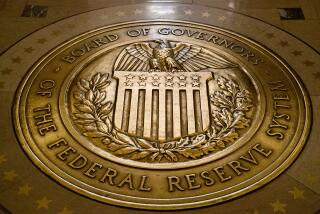Greenspan: an Outstanding Successor : Won’t Be Seduced by Calls for Just a Little More Inflation
- Share via
Paul A. Volcker has given President Reagan, the American people and the international financial markets eight years of outstanding service. The world is surely a better place because of the job that he has done.
When he took office in 1979, the United States faced runaway double-digit inflation. Five years ago there was a massive debt crisis in the developing countries that threatened our nation’s banking system and the political stability of the Western Hemisphere. Volcker’s skill and pragmatic style have permitted the country to deal successfully with both problems.
By the fall of 1982 a tough period of tight money had brought the inflation rate back to the more comfortable level of the mid-1960s. The record since then has been equally impressive. The Fed maintained the growth of the money supply on a path that supported solid non-inflationary expansion in a very difficult environment in which major changes in banking regulations and decreases in interest rates caused sharp and unpredictable shifts in the demand for money.
Volcker was the central intellectual figure in developing a strategy for dealing with the debt situation in the developing countries. By maintaining pressure both on the banks and on the debtor countries, he has helped to keep the debt problem on a gradual work-out path that has protected our banking institutions and should eventually return the debtor countries to normal access to the credit markets. But if Volcker has decided that he does not want another four years at the Fed, Alan Greenspan is the outstanding choice as his successor. Green-span is a wise and experienced market-oriented professional economist who will approach his new responsibilities without ideological blinders.
Greenspan’s immediate task will be to reassure financial markets that the change in leadership at the Fed will not bring with it a change in the direction of monetary policy. That will be particularly true in the pursuit of price stability and in the approach to the international debt problem.
Like Volcker, Greenspan is a committed opponent of inflation. He will firmly reject the seductive calls of those who claim that a little more inflation is an acceptable price to pay for a lower rate of unemployment. Greenspan knows that such a trade-off does not last long, and that attempting to depress unemployment below its equilibrium level will simply start inflation on a new upward spiral.
When it comes to the international debt problem, Greenspan’s market orientation will protect him from the pressures for grand strategies of government bail-outs or government-imposed forgiveness by the banks. He is much more likely to favor the development of an active secondary market for securities backed by loans to the troubled debtors and the use of debt-equity swaps on a much larger scale than has been tried in the past. Such a market-oriented strategy would tie in well with such initiatives as Citibank’s setting aside $3 billion against losses in its loan portfolio as a prelude to disposing of loans in the secondary market and through debt-equity swaps.
Greenspan’s market-oriented thinking is also likely to make him more sympathetic than his predecessor to regulatory changes that will increase the banks’ opportunities to compete in different markets. Technology and international competition have been pushing deregulation faster than either Volcker or the Democratic leadership of the congressional banking committees liked. Greenspan will now join with the other Fed governors who have favored more rapid regulatory change.
Greenspan’s market orientation is also likely to mean a different attitude toward intervening to support the dollar in foreign exchange markets. Volcker has been a strong advocate of coordinated exchange rate intervention, and he recently said that he would raise U.S. interest rates by tighter monetary policy to protect the dollar’s value.
Though Greenspan must be careful not to frighten markets in the near term, he is more likely to recognize the power of international financial markets and to accept the dollar’s inevitable decline rather than risk the recession that might follow from excessive monetary tightening in the defense of a still overvalued dollar.
Volcker and Greenspan have both been strong critics of the federal budget deficit. It is the consequence of that deficit that may be the biggest problem that Greenspan will face during the next four years. The United States has become dependent on foreign capital to finance that deficit without destroying private investment in housing and in plants and equipment for business. If the inflow of foreign capital shrinks while the budget deficit remains undiminished, U.S. interest rates could rise sharply and precipitate a recession.
Establishing a credible multi-year program of reductions in entitlement spending and increases in tax revenue is the best way to prevent such a dangerous collision course. Perhaps Greenspan will succeed where Volcker couldn’t in persuading the Administration that such a fiscal shift is the key to a sound economic future.
More to Read
Get the L.A. Times Politics newsletter
Deeply reported insights into legislation, politics and policy from Sacramento, Washington and beyond. In your inbox three times per week.
You may occasionally receive promotional content from the Los Angeles Times.










